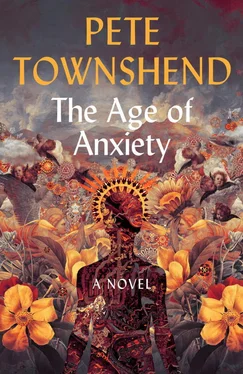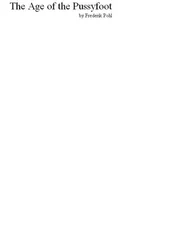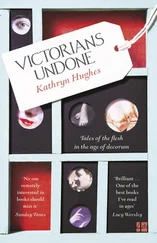Walter took out a slip of paper and showed it to me. He had written down what Old Nik had said.
You must learn to wait. The moment will come. Waiting is the black art of creativity, not inspiration. Be ready. Be alert. Always. And then when the moment comes, you will be waiting, and you will have nothing else to do, nothing better to do than to fall in love all over again. As I once was, you are the mirror of everyone around you. You are their conscience and their voice. Look to the future, whatever you see will come about, good and bad, it is inevitable. Look to the light.
“Fifteen years ago,” said Walter, “I wasn’t really ready to accept such an idea.”
“It’s beautiful,” I said. “And makes good sense. Are you ready now?”
“I’m not sure I’ll ever be completely ready,” he said, smiling wryly. “I’ve never been brave enough to face the job of making real and tangible what I hear.”
Fire. Flames. Crashing timbers. Roaring whoosh of air. Crackling, metal expanding, and creaking. Small explosions. Then a huge and thunderous eruption. The cries of firemen to each other, the beeping and snatching white-noise gasps of their radios. The sweep of the hoses. The sound of the generator in the fire engine. Glass shatters and falls. Occasionally what sounds like fireworks fizz and whizz, but it’s just various bottles of household chemicals exploding and each doing their unique chemical incineration thing. We hear the footsteps of a man, crunching over debris. The kid is alive, he says. A miracle.
Somehow, all that time alone in his garden, building a safe retreat for himself, a kind of spiritual hub around which the suburb of Sheen might have turned, Walter had not understood that he would never be able to shut down his connection with his peers, nor shut out their subconscious thoughts. For fifteen years of creative lockdown he had continued to be steadily filled with their emotions, their rage, fear, shame, resentment, and tendency to judge, their need to try to shift the blame for everything that was wrong with the world, and everything they might have done but had failed to do, failed in their drive to try to right significant wrongs.
He had first become aware of this starting to grind away in him in the months before he had decided to quit the band. Because it was at that time that Siobhan, mistaking his genius for the scrupulous industry of a poet in the making, had forced him to review his creative process, and in so doing he had stumbled upon this second sight of his, that both frightened and appalled him. And so he had run away and hidden. Sometimes when two people love each other, and adore and respect each other as had Siobhan and Walter, one of the pair is left utterly alone. She had known instinctively that Walter had some great mission before him. She had also hoped to support him, encourage and guide him to some extent. But then she had lost him.
Floss, by contrast, rode horses, brushed them, and mucked them out. It appeared she did very little else. She was always awake at sunrise or earlier in winter, and arrived at her stables near Richmond Park at seven in the morning. Sometimes Walter would be awake before she left the house and would be able to share tea or coffee with her. Usually he slept later, until about nine or ten. The rock ’n’ roll time clock was hard to change.
In fact, Floss played a big part in running the house. They had a single helper, a cleaner who doubled as housekeeper and came in every day but weekends, and only for a few hours. She shopped for the couple, and cooked, but did so according to recipes, menus, and shopping lists created by Floss. Floss went to snuggle up to her horses at weekends as well.
In the fifteen years they had been married they had never taken a holiday abroad. Floss entered gymkhanas and won prizes. They had a splendid compact horsebox with camping space that was kept parked at the stable. Walter joked that it would have served well as a bandwagon.
Walter was still not comfortable with horses; there had been the incident when his parents rode up to him on a beach when he was a child and then rode quickly away. This had not exactly traumatized him, but it had made it impossible for him to regard horses as anything other than instruments of escape. His parents had escaped their duty to their tiny son by riding away; was Floss now to do the same? This innate suspicion was always picked up by any Equus he approached; it was not appreciated.
Walter was all the while immersing himself in his stunning garden—to keep at bay the overwhelming sounds he might otherwise hear. Floss lost herself in her work with her horses, and especially the breeding work at her small stud; was this to stifle any instinct to have a child of her own?
I’d met Floss’s partner at the stables, her old school friend Ronnie Hobson. I knew Walter liked him, and trusted him around Floss partly because he was gay. He was exactly the same age as Floss, so about nine years younger than Walter, very striking-looking, slightly effeminate in speech but powerfully built. His back was straight and strong, he rode a horse like a Prussian colonel from another era, and I’d heard since that the predominantly female customers of the stable tended to describe his smile as “melting.”
Ronnie looked after the accounts at the stables, and the business made a profit. As well as being an accomplished horseman, he was something of a horse whisperer. He had trained Floss’s favorite seven-year-old, Dragon, and taught the extremely nervous horse and rider to jump. With another horse, Santana, a thoroughbred gelding they had acquired from a stud in Wiltshire, he added some gentle but effective dressage tutelage, bringing Floss’s teenage skills to the highest class. He coached Floss in all the important details of preparation that led to gymkhana wins and to the rising reputation of the stud. Floss adored Ronnie.
I knew that Selena claimed that Ronnie was “accompanied by a ghostly entity.” Floss joked that this was true, and that Ronnie’s “entity” was one Clive, a beautiful young waiter at All Bar One whose hair and skin were so pale, so lovely, that he might indeed have been a ghost.
The mothers and daughters of Sheen who availed themselves of Floss & Hobson Livery were fascinated by the intimacy between the business partners. Gay or not, when Ronnie flirted with Floss, she responded. The watchers believed they could see that something was not right. For years Walter ignored all this and the gossip it inspired, but when he started to try to compose again, he began to notice some electricity, some energizing spark between Floss and Ronnie that he had never felt in his own relationship with his wife.
No longer secure in his garden, he was bombarded by the buzzing pheromones and energies that Floss seemed to bring home with her after work. She was alive, completely. He had some way to travel to arrive at his own destination; he felt it might turn out to be precisely the opposite end of the spectrum of joie de vivre. Second sight as the Celts had known it was sometimes a precursor of death—not a premonition, but a vision of death as inevitability for the human race and every individual human soul, as in Old Nik’s vision on Skiddaw. But what Walter began to hear and feel as he opened his heart to his creative soul was not simply death. Rather, it was a connection with the fear of death felt by those around him. One can come to fear fear itself, and that particular fear seemed to be what Walter emanated when he tried to compose.
The soaring song of a lark sounds across the breathing din of a hundred-acre field. No wind, or else we’d hear nothing at all of the distant bird, but the low and thudding hubbub of a dozen tractors binding bales, or speeding cars and white vans on the motorway five miles across the hill, just beyond the steepled church. Of course, in the even, gentle breeze there is the sound of moving trees; once noted the sound is the familiar swishing that has a multitude of different degrees, from a kind of crackling to a simple hiss. All this is the backdrop to the sparkling, rising, dipping, falling call of the swooping bird. A goose from Halifax, Nova Scotia, lost his way home this time, challenges three others for the lake. He cackles, screams and barks, and splashes, trying to seem insane. They hoot back at him, determined not to give way. Intermingled are the laughs and giggles of a girl of about fifteen. She whoops as she runs, shrieks with joy and abandon. We need this water too. A single gosling rushes out, the reason for this fit of pique, like some demented child on speed or clockwork toy with wonky rudder, steering first this way then that, snapping flies perhaps. The noble mallards do their usual thing, a quack it’s best to call it. There are variations on the basic quack of course. Quacks come in threes and fours, all expressing some degree of mallardic irritation and impatience. The honk of a dismayed heron whose concentration simply cannot, must not, be disturbed. This may look like fishing to some who can be so amused, but this chap behaves as though he’s meditating for some Buddhist edge, some Sufi path, some perfect moment with a golden carp with bones removed and scales rubbed dry. The pigeons hoot like idiots, always fools, just one sound for every kind of emotional charge. The tits, the robins, jays, and rooks all jockey for the sky, the bush, the slug, the worm, the fly. The magpies search in packs like wolves for eggs to steal. And then without warning the twitcher’s world explodes, indeed becomes a proper world, and every flying thing we’ve ever seen and heard attempts to take some charge. For those of you whose hearing is, like Walter’s, a little smashed, the sound of some of these small birds, if slightly slowed to bring it better into the range of human hearing dimmed by years of blues and timpani booms, is a wondrous thing. Even lower then it will need to be for those of you who liked to shoot, to eat the bag, spit out the lead; you’re mutton, mate, that’s what we say. In all this high-pitched singing, all for love or space or food or flight, there is more music. From my tower I can reach out, no hair to hang, but still can touch the fairy tales of nature’s most prodigious collection of collectives. A startling of pianos; a pudding of Steinways; a persuasion of Marshall and Roses; a mesmerization of Bösendorfers; a consternation of Blüthners. Tweet. How did that single word ever come to mean the sound of bird? Anyway, anyhow, anywhere. Like flutes and pipes and reeded horns in flight, a concatenation of Charlie Parkers. Light. Stars. Magic.
Читать дальше












